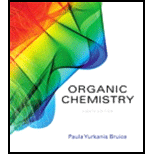
Concept explainers
Interpretation:
The percent of (R)-isomer present in the given sample of (S)-(+)-lactic acid has to be calculated.
Concept introduction:
The pair of Enantiomers has different configurations.
Pair of enantiomers has different optical activity, which means if one will show levorotatory then the other will show dextrorotatory.
The direction and magnitude of rotation of plane-polarized light by an optically compound is measured by using polarimeter.
This rotation of polarized light is specific for a compound at specified temperature and wavelength, so it is called as Specific rotation of that compound.
The specific rotation of enantiomers has equal magnitudes and opposite signs.
Racemic mixture (equal amounts of enantiomers) of a compound has zero specific rotation.
Want to see the full answer?
Check out a sample textbook solution
Chapter 4 Solutions
Organic Chemistry; Organic Chemistry Study Guide A Format: Kit/package/shrinkwrap
- Treatment of -D-glucose with methanol in the presence of an acid catalyst converts it into a mixture of two compounds called methyl glucosides (Section 25.3A). In these representations, the six-membered rings are drawn as planar hexagons. (a) Propose a mechanism for this conversion and account for the fact that only the OH on carbon 1 is transformed into an OCH3 group. (b) Draw the more stable chair conformation for each product. (c) Which of the two products has the chair conformation of greater stability? Explain.arrow_forwardIs DL-Homocysteine soluble in ether?arrow_forwardThe relative configurations of the stereoisomers of tartaric acid were established by the following syntheses:(1) d@(+)@glyceraldehyde T diastereomers A and B (separated)(2) Hydrolysis of A and B using aqueous Ba(OH)2 gave C and D, respectively.(3) HNO3 oxidation of C and D gave (-)@tartaric acid and meso-tartaric acid, respectively.(a) You know the absolute configuration of d-(+)-glyceraldehyde. Use Fischer projections to show the absolute configurations of products A, B, C, and D.(b) Show the absolute configurations of the three stereoisomers of tartaric acid: (+)-tartaric acid, (-)-tartaric acid, andmeso-tartaric acid.arrow_forward
- Is meclizine chiral? If so, how many of the possible stereoisomers are formed in this synthesis?arrow_forwardThreonine is a naturally occurring amino acid that has two stereogenic centers.a. Draw the four possible stereoisomers using wedges and dashed wedges.b. The naturally occurring amino acid has the 2S,3R configuration at its two stereogenic centers. Which structure does this correspond to?arrow_forwardWhy is it impossible to have only one enantiomer of thalidomide under biological conditions?arrow_forward
- Consider a solution made up of 90% R and 10% S. What is the enantiomeric excess (ee%) of the R enantiomer?arrow_forwardTo show that (R)-2-butyl (R, R)-tartrate and (S)-2-butyl (R, R)-tartrate are not enantiomers, draw and name the mirror images of these compounds.arrow_forwardUsing R and S descriptors, write all possible combinations (pairs) of enantiomers, diastereomers and meso forms.arrow_forward
- Esterase is an enzyme that catalyzes the hydrolysis of esters. It hydrolyzes esters of L-amino acids more rapidly than esters of d-amino acids. How can this enzyme be used to separate a racemic mixture of amino acids?arrow_forwardWhy must enantiomers be converted to diastereomers before separation processes such as crystallization?arrow_forwardExplain the method to separate enantiomers ?arrow_forward

 Macroscale and Microscale Organic ExperimentsChemistryISBN:9781305577190Author:Kenneth L. Williamson, Katherine M. MastersPublisher:Brooks Cole
Macroscale and Microscale Organic ExperimentsChemistryISBN:9781305577190Author:Kenneth L. Williamson, Katherine M. MastersPublisher:Brooks Cole Organic ChemistryChemistryISBN:9781305580350Author:William H. Brown, Brent L. Iverson, Eric Anslyn, Christopher S. FootePublisher:Cengage Learning
Organic ChemistryChemistryISBN:9781305580350Author:William H. Brown, Brent L. Iverson, Eric Anslyn, Christopher S. FootePublisher:Cengage Learning


